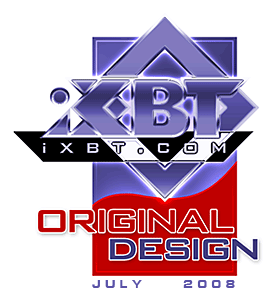 |
||
|
||
| ||
ConclusionsWe've just examined three products based on GeForce 9600 GT. Two of them operated at higher frequencies than the reference card. Besides, it was very interesting to see the effect of twice as much memory in these cards. So what have we got here? Increasing memory volume to 1 GB yields almost nothing on such cards. Performance grows in some tests. But it happens in those modes, where the speed is below the critical level (in high resolutions). So it makes no sense to buy the 9600 GT card with 1 GB of memory. What concerns increased operating frequencies, they have a positive effect on performance of both cards from Gainward. These cards compare favorably with their competitors and demonstrate a good price/performance ratio. Forsa GeForce 9600 GT 512MB (New edition) is the standard 9600 GT card with nominal frequencies. However, its modified PCB has no effect on graphics quality, its reliability, and stability. All these cards are equipped with a new cooler, which makes them even more attractive. Even though it takes up two slots, this cooling system demonstrates excellent efficiency and noiseless operation. Gainward BLISS 9600 GT PCX Golden Sample 1024MB is a very interesting product in terms of design and available connectors. The only possible problem is the lack of TV-Out, if you still need this feature. Large dimensions of the cooler are compensated by smaller size of the card itself. So it can be installed in most motherboards. Increased operating frequencies bring additional dividends to this product. However, 1 GB of memory yields nothing. So if the price difference between this card and a cheaper alternative is very big, you should take a closer look at the latter. Gainward BLISS 9600 GT PCX Golden Sample 512MB features all advantages and drawbacks of the previous product, but it's not equipped with excessive memory volume, which may have a positive effect on prices. So this card may be a good choice, I think. Both cards from Gainward were stable. We had no gripes. The 512MB card was even a tad faster than the 1024MB card in a number of tests, which can be explained by different memory timings written in their BIOS. All cards get the Original Design award:  To find more information about performance of various cards, visit our monthly special i3DSpeed. AfterwordA few words about our benchmarks. In our updated article about FRAPS, we have illustrated how crude and inaccurate tests with this utility are. Testers do not have other tools, except for benchmarks built into games. This article and its first part explain that it's sometimes possible to test games with integrated and identically looped demos. Although this implies lots of potential errors, since measurement accuracy depends on a given tester: whether he starts/stops FRAPS in time or does it too late/early. But I have run across situations, when demo load changes abruptly in the very beginning or end. So a half-second delay in starting/stopping the utility changes the average FPS by 15-20%. That's not a measurement error anymore - such a test is a total waste of time. One time you delay the test, another time you start it too early (not intentionally, of course), and you end up with absolutely different performance results. But even that's not the most important thing. The fact is, there are almost no games with built-in demos anymore. So, testers are forced to use a method that we deem totally unacceptable. They measure gaming performance by walking a straight line from the a starting point in a scene to a selected destination (the nearest fence, tree, etc.). We all understand that it's impossible to navigate to a finish spot in precisely the same route with different cards and in different resolutions. Besides, such games always introduce random elements into a scene, and objects may be placed slightly differently on the same scene. Unfortunately, websites that publish a huge number of tests do not always reveal their test methods for each game (except for those with built-in benchmarks). So, we believe that it's better to offer a limited number of game tests, but each will be crystal clear, accurate and showing actual differences between graphics cards. We express gratitude to Gainward for the provided graphics cards.
Write a comment below. No registration needed!
|
Platform · Video · Multimedia · Mobile · Other || About us & Privacy policy · Twitter · Facebook Copyright © Byrds Research & Publishing, Ltd., 1997–2011. All rights reserved. |